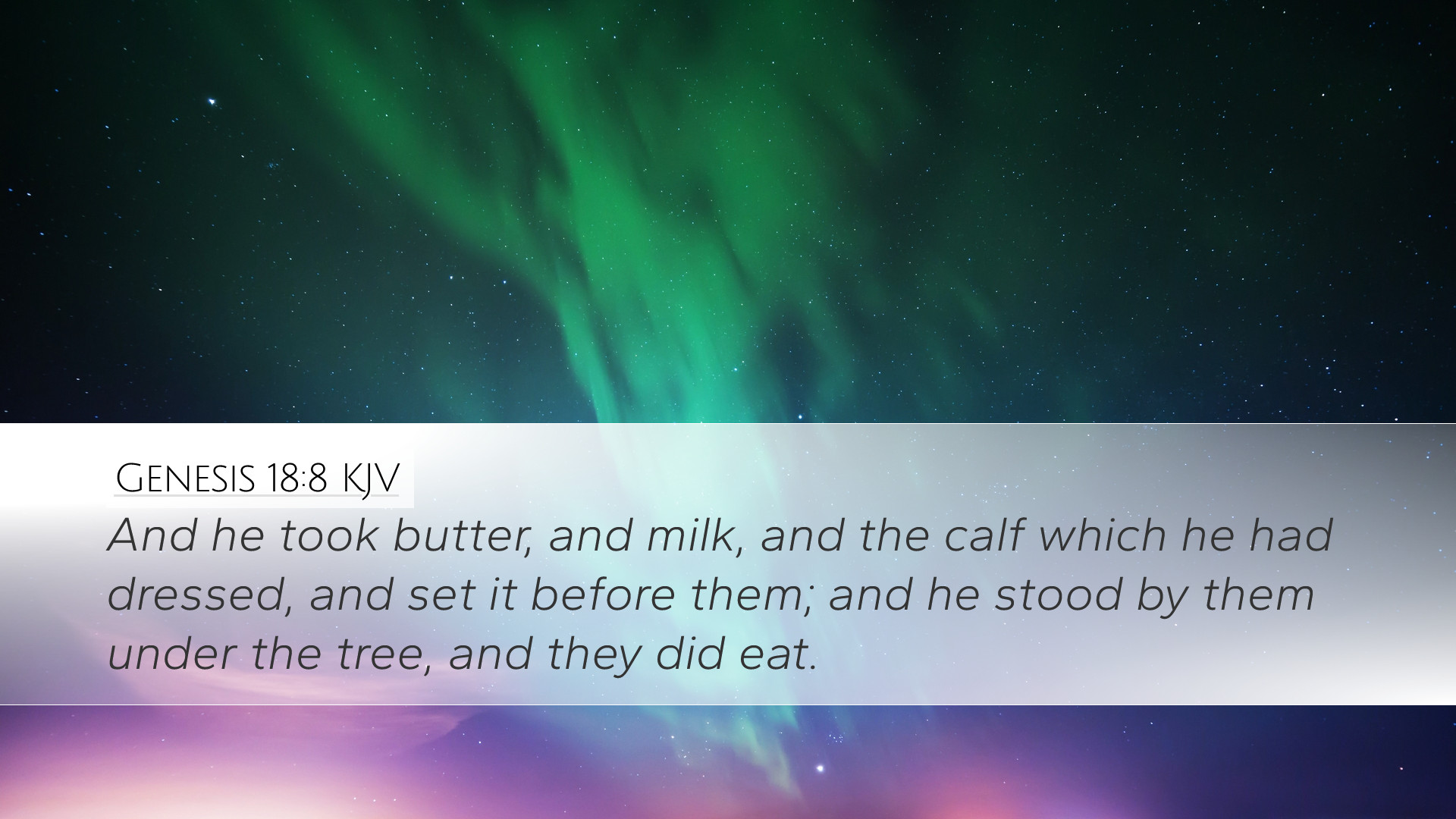Commentary on Genesis 18:8
Genesis 18:8: "And he took butter, and milk, and the calf which he had dressed, and set it before them; and he stood by them under the tree, and they did eat."
Introduction
Genesis 18:8 presents a simple yet profound scene that captures not only the act of hospitality but also the deep theological implications contained within it. In this verse, we find Abraham exhibiting the ancient Near Eastern tradition of hospitality to visitors who were, unbeknownst to him, angels of the Lord. This act of fellowship sets the stage for a significant revelation regarding God’s plan and promises.
Contextual Overview
The preceding verses in Genesis describe God appearing to Abraham in the form of three men. The encounter takes place at the oaks of Mamre, where Abraham was dwelling. This setting is significant as it denotes a place of abundance and divine encounters. Abraham’s subsequent actions, particularly his offering to these guests, highlight the cultural norms of hospitality that were expected in that era.
Commentary Insights
Hospitable Act
Abraham's immediate response to his visitors is telling of his character. Matthew Henry notes that his eagerness to serve reflects a “readiness to accommodate” that is commendable. He emphasizes the importance of hospitality as a virtue that aligns with godliness. This act serves not merely as a gesture of politeness, but as an embodiment of Abraham's righteousness and his understanding of God’s covenantal relationship.
Elements of the Meal
The ingredients chosen by Abraham—butter, milk, and a tender calf—are noteworthy. Albert Barnes reflects on the richness of these provisions, suggesting that they illustrate not only Abraham’s wealth but also the abundant blessings that accompany covenant faithfulness. This meal signifies a generous spirit and symbolizes the sustenance of divine fellowship. Moreover, the choice of food may also represent spiritual nourishment, where the physical act of eating transcends into a deeper communion with God.
Theological Significance
The act of serving food is pivotal in theological contexts. Adam Clarke provides insight into the significance of communion through sharing a meal, which has deep roots in covenant theology. This interplay between the act of eating and divine communication correlates with the later Jewish understanding of meals as sacred gatherings where God's presence is foremost. The encounter at this meal foreshadows Christ’s ministry, where He often dined with others, signifying openness and the breaking of barriers between God and humanity.
Symbolism of the Tree
Abraham's positioning by the tree as he served the meal (Genesis 18:8) is also rich in symbolism. Trees in biblical literature often symbolize strength, life, and the presence of God. The imagery of Abraham standing by the tree as the guests eat suggests a protective and attentive stance, affirming his role as a mediator between God and man. It may also point to the eventual revelation of God's covenant plans, closely aligning with how trees represent the covenant relationship throughout Scripture.
Applications for Faith Communities
Cultivating Hospitality
This passage provides a model for modern believers in the practice of hospitality. It’s a call to open one’s home and heart, to serve others with joy, reflecting Christ’s love. Pastors and community leaders can draw from Abraham's example to encourage congregations to welcome strangers and foster environments of inclusion and care within the community.
Understanding Divine Encounters
Furthermore, Genesis 18:8 challenges the reader to be open to divine encounters that may come in unexpected forms. The disguised nature of God’s messengers invites reflection on our own willingness to engage with the divine. This may prompt believers to seek God in the mundane, recognizing that moments of revelation often arise from acts of kindness and hospitality.
Conclusion
Genesis 18:8 serves as a multi-layered passage that intertwines hospitality, covenant theology, and God’s unfolding plan. As Abraham extends kindness and provisions to his guests, he not only demonstrates virtue but also partakes in a divine dialogue critical to the fulfillment of God’s promises. This verse invites pastors, theologians, and students alike to delve deeper into the rich tapestry of hospitality as a biblical principle while recognizing its implications for modern faith practices.


